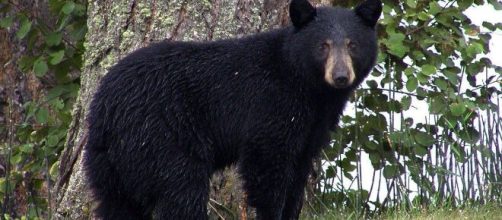More than 12 million people visited the Great Smoky Mountains National Park, in the United States, in 2020. One of the park's biggest attractions is the bears. Sightings are common, especially in spring when their main source of food is not yet ripe, and they spend much of their time foraging for something to eat. Unfortunately, well-meaning tourists often try to feed the bears or use food to lure them closer for photos.
The situation is worse this time of year because natural food is scarce or until the summer berries ripen say National Park Service.
“Visitors should observe bears from a distance of at least 50 yards and allow them to forage undisturbed," the park said in a recent press release. "Hikers are reminded to take necessary precautions while in bear country including hiking in groups of three or more carrying bear spray.”
The offender
A 27-year-old woman travelling with two other adults, who have not been publicly identified by authorities, was captured on video feeding peanut butter to a bear in the Cade's Cove campground. The woman was tracked down when 'witnesses provided video documentation" of the incident, according to a news release from the Park Service. The woman could be seen tossing "peanut butter balls" to the bear.
After she was tracked down on June 3, the offender was issued a citation that could carry a fine of up to $5,000, and a jail sentence of up to six months.
However, officials say she could receive a fine of as little as $100 if she pleads guilty at her court appearance.
Why you should not feed bears
“Managing wild bears in a park that receives more than 12 million visitors is an extreme challenge and we must have the public’s help,” park wildlife biologist Bill Stiver said in a press release.
“It is critical that bears never be fed or approached — for their protection and for human safety.”
Feeding bears can cause them to lose their natural fear of humans, and they begin to view humans as a source of food. Once this happens the bears have to be sedated, tagged, and moved to other areas of the park. If they continue to approach humans or become aggressive, they often have to be euthanised.
Aggressive bears can view humans as an easy meal, which can lead to deadly circumstances.
Bear alerts issued by U.S. Forest Service
Due to high activity by aggressive bears the U.S. Forest Service has issued alerts for some sections of the park along the Appalachian Trail in the Great Smoky Mountains National Park and the Nantahala National Forest. A 13-mile stretch of the AT, from mile 451 to mile 464, is closed to camping, although hiking is still allowed on that section of the trail.
What to do if you encounter a bear
The NPS estimates 1,500 bears call the park home, meaning bear encounters are common, but rarely result in an injury to humans. Only one person is known to have been killed by a bear in the park since it opened in 1931.
That doesn't mean bears are not dangerous. First, do not attempt to approach any bear. It is illegal to approach within 50 yards of a bear or to get close enough to disturb or displace the bear.
For more information on bears and what to do in the event, you encounter an aggressive bear visit the National Park Service website, NPS.gov.


